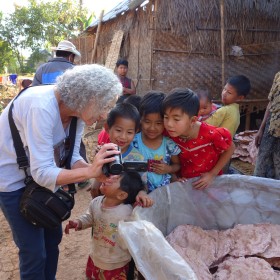 I just returned from a fascinating trip to Burma, also known as Myanmar, one of the world’s last frontiers. It’s the second largest country in Southeast Asia, with a population of 60 million and over 53 million Buddhists. On water or land – walking, biking, hiking – gentle, friendly and kind people welcomed us.
I just returned from a fascinating trip to Burma, also known as Myanmar, one of the world’s last frontiers. It’s the second largest country in Southeast Asia, with a population of 60 million and over 53 million Buddhists. On water or land – walking, biking, hiking – gentle, friendly and kind people welcomed us.
I don’t know about you, but it feels like I’m always in a race against the clock. For the past three weeks I slowed way down. Of course we were on vacation so that says a lot in itself. But the Burmese naturally know how to breathe deep, meditate and relax. They say Buddhism is not a religion but a way of life.
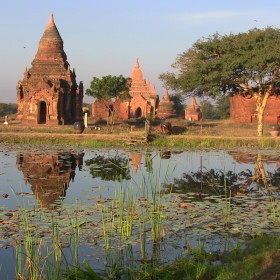 Legendary Bagan, on the banks of the Irrawaddy River, has over 4,000 pagodas, stupas and temples, many dating back to the 11th century. We explored the ancient city in a horse drawn cart and our driver told us he was saving money to buy a taxi. He feels guilty and apologetic when he uses his whip as he knows his horse is reincarnated. With the Buddhist temperament of ‘do no harm’ he hopes to reach the state of nirvana.
Legendary Bagan, on the banks of the Irrawaddy River, has over 4,000 pagodas, stupas and temples, many dating back to the 11th century. We explored the ancient city in a horse drawn cart and our driver told us he was saving money to buy a taxi. He feels guilty and apologetic when he uses his whip as he knows his horse is reincarnated. With the Buddhist temperament of ‘do no harm’ he hopes to reach the state of nirvana.
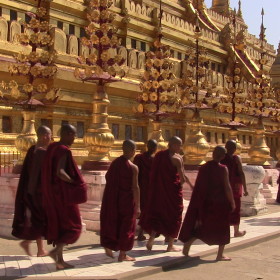 Reverence for Buddha’s philosophy is omnipresent. You see his image and philosophy everywhere. Monks represent one-tenth of the population and often spend their youth in a monastery learning Buddha’s teachings and living by the volunteered kindness of the community. They give up all worldly possessions and have none of the distractions of modern life.
Reverence for Buddha’s philosophy is omnipresent. You see his image and philosophy everywhere. Monks represent one-tenth of the population and often spend their youth in a monastery learning Buddha’s teachings and living by the volunteered kindness of the community. They give up all worldly possessions and have none of the distractions of modern life.
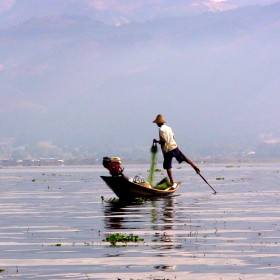 Inle Lake, which measures 22 by 15 miles, has 17 villages with houses built on stilts. Some local people farm tomatoes, gourds or beans on floating islands. Others make a living on the water, balancing their dugout canoes while fishing with bamboo spears and conical nets. Multi-generational families live together and everyone pitches in. Babies feel secure swaddled in a carrier on their mother’s back or are cared for by grandmas and sibling but a few years older. The family works together and children as young as three learn to row the boat with one foot. Unfortunately many leave school after 4th grade to help in the fields.
Inle Lake, which measures 22 by 15 miles, has 17 villages with houses built on stilts. Some local people farm tomatoes, gourds or beans on floating islands. Others make a living on the water, balancing their dugout canoes while fishing with bamboo spears and conical nets. Multi-generational families live together and everyone pitches in. Babies feel secure swaddled in a carrier on their mother’s back or are cared for by grandmas and sibling but a few years older. The family works together and children as young as three learn to row the boat with one foot. Unfortunately many leave school after 4th grade to help in the fields.
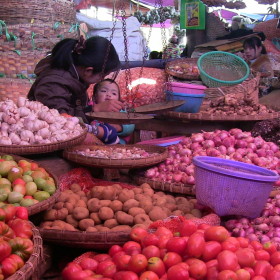 With a wealth of natural resources, there are teak and bamboo forests as well as ruby, sapphire, pearl and jade mines. The major agricultural product is rice and there are many derivatives like rice cakes and rice wine. With plenty of rich soil for farming, there’s no shortage of delicious fresh fruits and vegetables in the local markets.
With a wealth of natural resources, there are teak and bamboo forests as well as ruby, sapphire, pearl and jade mines. The major agricultural product is rice and there are many derivatives like rice cakes and rice wine. With plenty of rich soil for farming, there’s no shortage of delicious fresh fruits and vegetables in the local markets.
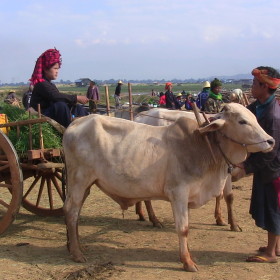 We take for granted the freedoms and rights in our constitution, but Burma lived for years under laws imposed by a military government. The last day of our trip we were privileged to have lunch with Ko Pyone Cho and his wife, Wahwah Win. Imprisoned for 20 years after the student uprising of 1988, his organization now supports Aung San Suu Kyi, Nobel Prize winner and chairwoman of the National League for Democracy. Ko Pyone Cho is Secretary of Human Rights Sector for The 88 Generation and I’m humbled by their optimism. Their efforts represent the interests of the people and, hopefully, the future of Burma.
We take for granted the freedoms and rights in our constitution, but Burma lived for years under laws imposed by a military government. The last day of our trip we were privileged to have lunch with Ko Pyone Cho and his wife, Wahwah Win. Imprisoned for 20 years after the student uprising of 1988, his organization now supports Aung San Suu Kyi, Nobel Prize winner and chairwoman of the National League for Democracy. Ko Pyone Cho is Secretary of Human Rights Sector for The 88 Generation and I’m humbled by their optimism. Their efforts represent the interests of the people and, hopefully, the future of Burma.
Click on the photos above to see them in actual size. And if you want to read more about travel, please click these links for articles about Bhutan, Morocco, Costa Rica, Croatia and Japan. We welcome your comments below. And if you want to share travel stories or photos, email your information to Mentors@HerMentorCenter.com.









